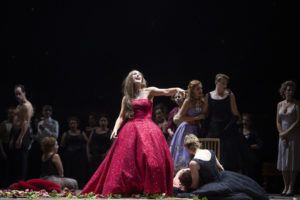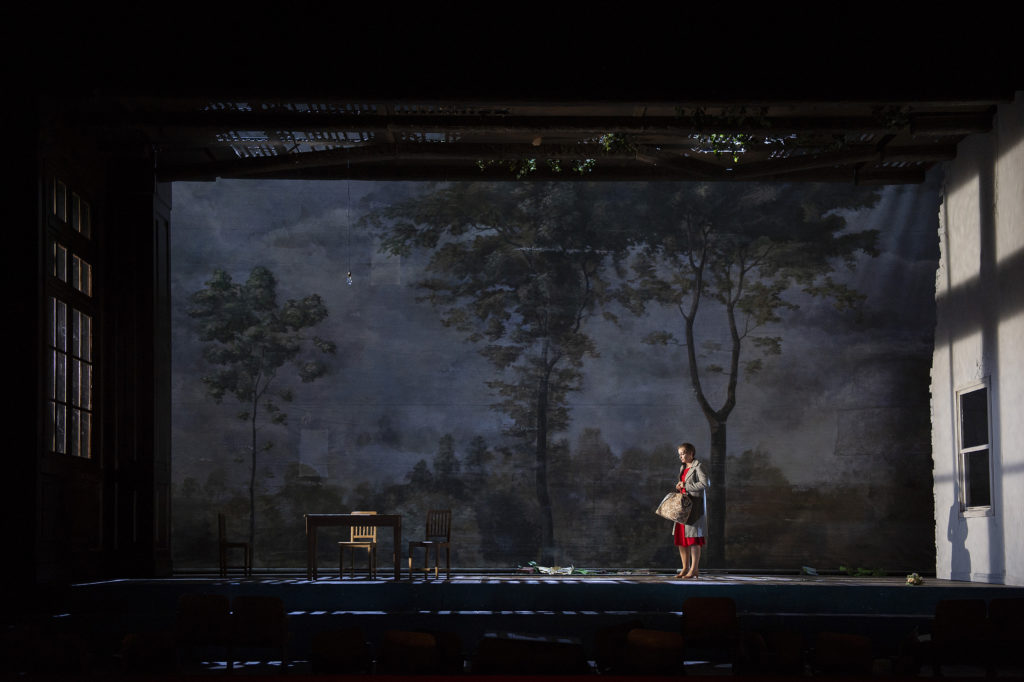
Royal Swedish Opera 2019-20 Review: Der Ferne Klang
A Wondrous Success For Schreker’s Unique & Fascinating Work
By Sebastian Turgeon(Photo credit: Monika Rittershaus)
As the first new production of the new season, the Royal Swedish Opera offered up “Der ferne Klang” from Franz Schreker, a work not seen on this stage since 1927.
Created in Frankfurt in 1912, “Der ferne Klang” is a complex work composed over almost the entire first decade of the 20th century. The success at its premiere helped Schreker establish himself on the German musical scene but the composer’s works were later banned by the Nazi regime. While there had been previous efforts to keep his works in the repertory, it is not until recent years that Schreker’s operas have been presented more consistently.
Redemption Through Love
It is the story of Fritz, an opera composer, who struggles to put down on paper the distant sound (or Der ferne Klang in German) that he hears. He decides to leave his beloved fiancé Grete to dedicate his life in the search of this distant sound.
In the meantime, Grete’s parents attempt to marry her off to settle a gambling debt but she escapes. Fritz meets Grete again 10 years later, but seeing that she became a courtesan, he spurns her. When finally he is able to complete his opera, the first performance is a failure. Meeting again with Grete, who has become a street prostitute, he finally hears the sound that eluded him all these years. Understanding that he can only hear the music in Grete’s presence and love, they vow to stay together but he dies in her arms.
This narrative is weaved in a complicated and detailed story which tells Grete’s journey over a span of 25 years as she escapes home, lives in Venice as a courtesan and finally comes back to Germany as a prostitute and attends the premiere of the opera. Also the librettist, the late romantic Schreker reflects on contradictory themes: the purity of love against destructive lustful passion, elusiveness and proximity, moral decline and overbearing obsession, ambiguity and uncertainty. But all this is told without knowing or judging what is correct or acceptable. Here, the sympathetic prostitute survives instead of dying, and provides the final inspiration to the dying composer.
The music is very modern and at the core of the story. The orchestration is powerful, expressive, complex, extravagant and a bit over-the-top. It is very “German,” but always tonal and with impressionistic influences and a dream-like, almost hypnotic quality – a bit like a mix of Mahler and Debussy. It is lyrical and dramatic, very dark, sometimes loud and at other times very quiet. The sense of distance and the concept of space, so central to the story, are omnipresent in the music.
In the score, Schreker skillfully included off-stage chorus, off-stage action and musicians further up on stage throughout the story, and sometimes even playing different melodies at the same time.
An Effective & Enjoyable Production
This new production is by German director Christof Loy, who successfully brings together all these themes and characters in a very effective and coherent way. His staging is timeless, respectful of the music and the libretto but perhaps a bit conventional conceptually. There was evidently a lot of attention and preparation in the movements and choreography of all characters on stage. The result is a very detailed staging that matches the detailed score. It is apparent that the entire company bought into Loy’s concept and the result is a very convincing depiction of the story.
In Loy’s concept, the front of the stage is used as an area where character can look into the story, as if they are spectators. Two steps separate this area from the main stage where the action occurs and it consists of a mess of seats that could look like music stands, with their back facing the audience.
From the overture, this area is used by Fritz when he tries to compose music. During the first act, after he leaves Grete, he takes a seat front stage and looks at the action. With this concept, Loy blends reality and fiction in the storytelling and uses it very effectively to highlight Fritz’s search for the sound.
(Photo credit: Monika Rittershaus)
A Musical Success
The Royal Swedish Orchestra, usually at ease in German and modern works, here surpasses itself as they played extraordinarily well, with beautiful colors and textures.
Swiss conductor Stefan Blunier, specialist of the music of Schreker, led the orchestra in a detailed and cohesive execution of the score. The orchestration is, in general, very heavy and even if the orchestra played with varied dynamics, the sound was often very loud. With the exception of the finale of the second act, it was, however, always possible to distinctly hear the singers, even though generally the balance of sound was in the orchestra’s favor.
The cast was entirely Swedish, with two international singers in the main role, supported very aptly by singers in the secondary roles which included several principals of the company.
The excellent tenor Daniel Johansson took on the role of Fritz. Indisposed with a cold for the last two weeks of rehearsals and on the evening of the premiere, the audience was asked for understanding. Nevertheless, he gave a very solid and nuanced interpretation of his role. His tenor was lyrical, passionate, beautiful and expressive. Johansson easily commanded the stage vocally and dramatically.
Making her long awaited debut at the Royal Swedish Opera, Agneta Eichenholz was assigned the very demanding role of Greta. Almost always on stage, she sang and acted with great energy and enthusiasm. Her soprano is mid-sized, very expressive, more lyrical than dramatic, and well-projected. Her Grete is strong, direct and unapologetic. Eichenholz was able to carry the show from beginning to end with her mesmerizing stage presence.
Holding four minor roles, Miriam Treichl was excellent, bringing her dark and powerful mezzo to four very different characters. As the Dr Vigelius and the Baron, Lars Arvidson contributed with his towering presence and a powerful bass.
Baritone Ola Eliasson played the Count, one of Grete’s many suitors, and Rudolf, a sort of inspiring impresario for the Fritz the composer. His characters were omnipresent and, with his strong stage presence, he added a mysterious layer to the story. He sang very well, with a strong and sturdy voice.
As the Actor, baritone Jeremy Carpenter sang with elegance while Vivianne Holmberg as Mizzi made the most of her short role. Several others rounded up the cast. The chorus was a strong participant in the action and sang very well (as usual).
All-in-all, this was a very successful and satisfying performance, both musically and dramatically. The premiere of “Der ferne Klang” was broadcasted live on Swedish Radio and the recording is currently available for replay on the internet.




